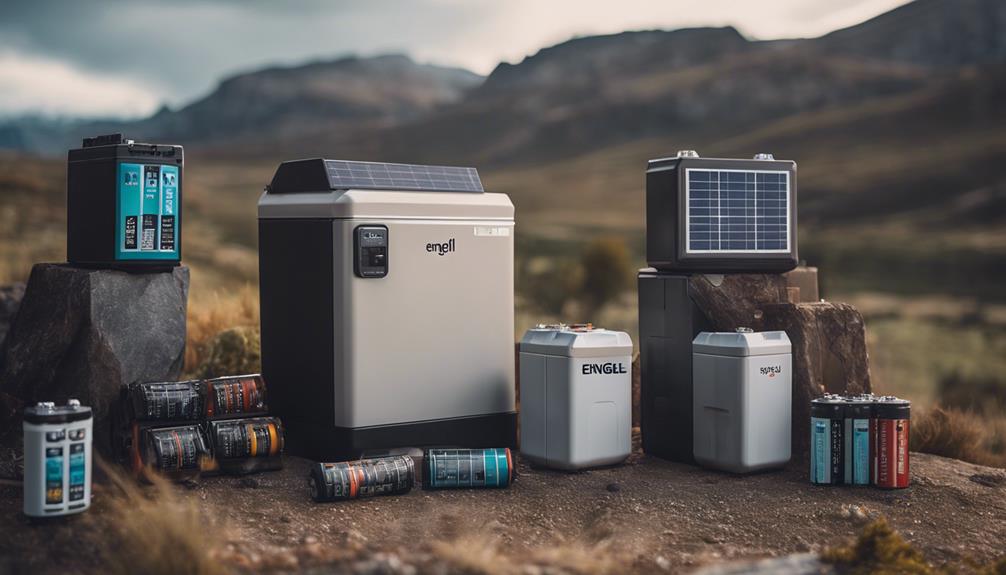Discovering why ice cream may contain hidden gluten is important – additional ingredients such as wheat flour or modified food starch could be to blame. It’s crucial to be cautious, as cross-contamination can introduce gluten into these frozen treats. Those with celiac disease should be especially vigilant for any hidden gluten in ice cream. Pay close attention to labels to ensure your ice cream is truly gluten-free, and consider choosing simpler, more natural flavors to reduce the risk. Exploring surprising sources of gluten could help you make smarter choices when indulging in your favorite ice cream treats.
Key Takeaways
- Ice cream may contain gluten from added wheat flour or modified food starch.
- Cross-contamination in facilities can introduce gluten into ice cream products.
- Individuals with celiac disease must be cautious of hidden gluten in ice cream.
- Reading labels carefully is crucial to ensure ice cream is gluten-free.
- Opt for natural flavors to reduce the risk of consuming gluten in ice cream.
Ice Cream and Gluten
When selecting ice cream, always be mindful of potential gluten content to guarantee a safe consumption experience.
Some ice cream varieties contain gluten due to added ingredients like wheat flour, modified food starch, or cookie pieces.
Even if a flavor seems innocent, cross-contamination in facilities can introduce gluten into ice cream products. This poses a risk for individuals following a gluten-free diet, especially those with celiac disease who must be cautious of hidden gluten in their favorite frozen treats.
To make certain that your ice cream is gluten-free, make it a habit to read labels carefully. Opting for simpler, more natural flavors can also help reduce the risk of consuming gluten in ice cream.
Medications and Supplements

Be cautious when it comes to medications and supplements as they can potentially contain hidden gluten, posing risks for individuals with gluten sensitivity or celiac disease.
Gluten may be used as a filler or coating in medications and supplements, making it important to review ingredients on over-the-counter products carefully.
When it comes to prescribed medications, consulting a pharmacist to check for gluten content is vital to guarantee safety for those with gluten sensitivity.
It's essential to be aware of hidden gluten in medications and supplements to prevent adverse reactions in individuals with celiac disease.
Additionally, individuals with celiac disease may need to pay attention to their nutrient intake, as research suggests they may require more B vitamins, vitamin D, and iron due to potential deficiencies.
Consulting a healthcare provider is recommended to confirm that nutrient needs are met, especially for those following a gluten-free diet.
Meat and Poultry

Watch out for gluten in poultry and meat products as they can be sources of contamination.
Hydrolyzed wheat protein in processed meats like cold cuts, hot dogs, and sausages may contain gluten, so always read labels carefully.
Be cautious of self-basting poultry or seasoned turkey breast, as they may also have gluten-containing ingredients.
Gluten in Poultry
Check for gluten in meat and poultry products by reviewing labels carefully, as additives like hydrolyzed wheat protein can be present, especially in processed meats such as cold cuts and sausages. Foods like seasoned meats and self-basting poultry may also contain gluten due to the use of gluten-containing ingredients in their preparation.
Deli meats and seasoned turkey breasts should be checked for gluten content to make sure they're safe for consumption. It's essential to be vigilant when selecting poultry products, as gluten can hide in unexpected places. By being mindful of the ingredients and opting for gluten-free alternatives when necessary, you can enjoy your favorite poultry dishes without worry.
Remember to always read labels thoroughly and reach out to manufacturers if you have any doubts about the presence of gluten in meat and poultry products.
Meat Contamination Risks
Processed meat and poultry products can pose contamination risks, including the presence of gluten in fillers and seasonings. Meats such as cold cuts, hot dogs, and sausages may contain gluten due to added ingredients. When selecting meat products, it's pivotal to check the label for any potential gluten-containing additives.
Hydrolyzed wheat protein, commonly found in meat, fish, and poultry items, can also contribute to gluten contamination. Self-basting poultry or seasoned turkey breast are examples of products that may contain gluten, emphasizing the importance of carefully reviewing packaging information. Deli meats and seasoned meats should be approached with caution, as they might include gluten as an ingredient.
Gluten can be sneakily hidden in various meat products, underscoring the necessity of scrutinizing ingredients and opting for gluten-free alternatives whenever necessary. Be vigilant when purchasing meat and poultry items to avoid inadvertently consuming gluten.
Meat Substitutes

When selecting meat alternatives, be cautious that gluten may be present in veggie burgers and sausages because of the use of gluten-containing fillers for texture.
Besides veggie burgers, imitation seafood and seitan are other meat substitutes that might unexpectedly contain gluten. Gluten sneaks into meat alternatives for taste and texture, so always examine the ingredients list to verify they're gluten-free.
To stay protected from concealed gluten in meat substitutes, choose products clearly labeled as gluten-free.
- Always carefully review the ingredients label to detect any hidden gluten.
- Don't presume that all meat substitutes are gluten-free; some may include gluten-containing fillers.
- Select products specifically labeled as gluten-free to eliminate any risks.
- Be wary of imitation seafood products as they may also contain gluten.
- When uncertain, reach out to the manufacturer to confirm the gluten-free status of a meat substitute.
Chips and Fries

Be cautious when selecting chips and fries as they may contain gluten due to seasonings and potential cross-contamination during frying processes. Potato chips often have seasonings that contain gluten, so it's important to carefully read labels to verify they're safe to consume.
Additionally, French fries and tortilla chips might be fried in the same oil as gluten-containing foods, leading to cross-contamination risks. This contaminated oil can be harmful, especially for individuals with celiac disease.
Some potato chips may also contain malt vinegar, which is made with wheat, posing a threat to those sensitive to gluten. To steer clear of unexpected sources of gluten, opt for products that are clearly labeled as gluten-free.
Checking for this labeling on chips and fries can help you make informed decisions and enjoy these snacks without worrying about potential gluten exposure. Stay vigilant and prioritize your health by choosing gluten-free options whenever possible.
Oats and Gluten

When it comes to oats and gluten, it's important to be aware of cross-contamination risks.
Even though oats are naturally gluten-free, they can pick up gluten during growing or processing.
Opting for certified gluten-free oats is the safest choice for those following a gluten-free diet.
Oats Cross-Contamination Risks
Cross-contamination risks associated with oats and gluten are a critical concern for individuals with celiac disease. Oats, although naturally gluten-free, are susceptible to contamination throughout the growing, processing, or packaging stages.
Here are some emotional points to ponder:
- The fear of unintentional gluten exposure from oats can cause anxiety and stress for individuals with celiac disease, impacting their quality of life.
- Consuming oats that have come into contact with gluten-containing grains like wheat, barley, or rye can trigger painful symptoms and digestive issues for those with celiac disease.
- The constant vigilance required to ensure oats are free from gluten can be mentally exhausting and add an extra layer of complexity to daily meal planning.
- Trusting that oats labeled as certified gluten-free have undergone rigorous testing and meet strict standards can provide a sense of relief and security for individuals with celiac disease.
- The importance of choosing certified gluten-free oats can't be overstated, as even small amounts of gluten can have serious health consequences for those with celiac disease.
Certified Gluten-Free Oats
To secure your safety and peace of mind as someone with celiac disease, opting for certified gluten-free oats is a smart choice when it comes to incorporating this nutritious grain into your diet.
Certified gluten-free oats are oats that have been tested and confirmed to contain less than 20 parts per million of gluten, making them safe for people with celiac disease. These oats are processed and handled in a way that minimizes the risk of cross-contamination with gluten-containing grains like wheat, barley, and rye.
By choosing certified gluten-free oats, you can enjoy the nutritional benefits of oats without experiencing gluten-related symptoms. Make sure to look for trusted gluten-free certification labels on oat products to ensure they meet the necessary standards for a gluten-free diet.
Certified gluten-free oats provide a safe and reliable option for incorporating this nutritious grain into a gluten-free lifestyle.
Frequently Asked Questions
Why Does Ice Cream Contain Gluten?
Ice cream may contain gluten due to ingredients like wheat flour used as a thickener. Cross-contamination in production facilities is another concern. Be vigilant in reading labels and opting for gluten-free brands to avoid gluten exposure.
What Surprisingly Contains Gluten?
Watch out for unexpected sources of gluten in foods like sauces, soups, and processed meats. Always read labels carefully and choose gluten-free options to safeguard your health. Stay vigilant to avoid unintentional gluten exposure.
What Are the Hidden Gluten Additives?
When checking for hidden gluten additives in ice cream, be cautious of wheat flour, modified food starch, and cross-contamination. For those with gluten sensitivities, carefully reading labels and seeking gluten-free certifications can help avoid potential health risks.
Why Is Everyone Suddenly Gluten-Free?
You're seeing more gluten-free choices because of increasing awareness about celiac disease and gluten sensitivity. People opt for this diet for various reasons like digestion, weight, or health. Remember, consult a pro before going gluten-free.
Can Ice Cream Essence Contain Gluten and Surprise Ingredients to Watch Out For?
Yes, ice cream essence flavor ingredient can contain gluten and surprise ingredients to watch out for. Some flavorings and additives in ice cream essence can include gluten or unexpected allergens. It’s essential to carefully read labels and be aware of potential hidden ingredients that may not be safe for those with sensitivities.
Conclusion
So next time you're indulging in some ice cream or reaching for a snack, remember to check the ingredients list for gluten. You never know where this sneaky protein might be hiding!
Stay informed and keep an eye out for unexpected sources of gluten in your favorite foods. It's always better to be safe than sorry when it comes to managing a gluten-free diet.









